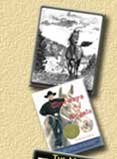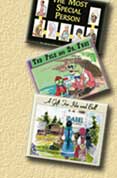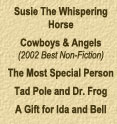
Michael's Monthly Column "Throwing My Loop"
HUMANSHIP…
“Who are those people? asked
the child.
Sitting in the pew beside his son, the father turned
and saw the stained glass windows in the little church.
Brilliant hues of swirling colors in each, and in each shone
a painted human figure illuminated by the rays of the Sunday
morning sun.
“Oh,” said the father. “Those are saints.”
A bit over ten years ago
now, had you asked me, “What kind of horseman are you?” I
would have given myself a fairly high score. After all, my
Daddy put me on my first one at the age of three. Been
around them all my life, and “training” horses wasn’t really
all that difficult. You just rode them ‘til they quit
bucking, and then told them what to do. If they didn’t do
it, you might try several more times, and if they still
didn’t do it, the explanation was simple – that horse just
wasn’t a ‘good one.’ And I sailed along with that smug and
superior attitude for years. Then something happened…
About age 45 I had the crushing realization that
not only was I a far cry from a skilled horseman, in fact I
knew very little about them at all. Luckily, I found some
help from a varied group of people, all of whom we might
place under the general category heading of…horsemen.
As I heard and read Ray Hunt,
Tom and Bill Dorrance, Craig Cameron, Pat Parelli and
others, my awareness grew, my understanding increased, and
my horses were most appreciative. They will be the first to
tell you I have a long way to go, but at least I’m aware of
that now.
These men and others talk about ‘horsemanship.’ In a
recent magazine article, noted trainer Van Hargis offered
his thoughts on that subject. “I guarantee you,” he begins,
“if you wish to become a good horseman, you begin a
never-ending journey. Like so many other things in this
awesome world, the more we learn, the more there is to
learn.” And then Hargis offers his definition of what
‘horsemanship’ means to him. “Horsemanship,” he says, “is a
journey of learning, as much about yourself as about
the horse. Horsemanship is a lesson in humility and
respect, love and caring, dedication and honor, heritage and
tradition, exploration and communication.” And Hargis
concludes with these words… “The goal is to provoke thought,
provide assistance and act from the perspective of good
horsemanship.”
I really like that. We need that. I was never a mean
man with my horses, but the realization has become so clear
inside me that the better I get, the better my horses rope.
When I’m having trouble helping my horse see something I
want him to do, I no longer say, “My horse is…” Instead, I
now say, “I’m causing my horse to…” And that is an
improvement.
That awareness that I’m causing my problems in life
brings to mind one of my favorite stories about G.K.
Chesterson, the portly British humorist and Christian
writer. (You never saw those words put together before, did
you? Portly British humorist, and Christian writer?). The
London Times held a contest wherein they solicited the
greatest writers in the world at the time - such notables as
George Bernard Shaw, C.S. Lewis, Chesterson and others - and
asked them to write an essay answering a single question.
The question was, “What is wrong with the world?”
All the famous writers wrote brilliant essays, but
Chesterson’s entry consisted of only a single sentence. He
wrote, “Dear London Times, In response to your request for
an essay regarding what is wrong with the world…I am.”
Sincerely yours, G.K. Chesterson. Chesterson won.
The reason I’m so impressed with Hargis’ analysis of
horsemanship and Chesterson’s wit is that within both I find
a reminder of another little problem I had about the same
time I realized my horsemanship skills were lacking. I had
precisely the same problem with people.
Had you asked me ten years ago, “How perceptive are you
about people? How would you rate your people skills?” I
would have given myself a fairly high score. After all, I
had been around them since I was born. I dealt with people
even before my Daddy put me on a horse, and ‘training’ or
‘teaching’ or ‘supervising’ people wasn’t really all that
difficult. Just like with horses…you showed them who was
boss, and told them what to do. You might have to tell them
a few times, and if that didn’t work - well…the explanation
was obvious. That student or employee wasn’t a ‘good one.’
I sailed along with that smug and superior attitude for
years. Then something happened.
At about age 45, I had the crushing realization that
not only was I a far cry from a ‘human relations expert,’ I
knew very little about humans at all. Luckily, I found some
help from a varied group of people, all of whom we might
place under the general category heading of…good human
beings.
These were not spiritual gurus handing out flowers at
airports, but rather ordinary people who were doing
extraordinary things in the lives of other humans and in the
lives of horses. A second grade teacher who had children
following her down the hall like the pied piper. A logger
that paid his men Monday through Friday, and gave them the
week-end off, yet his men would come help him move equipment
on Saturday simply because they wanted to help him. When I
asked one of his hands why he said, “Because he’s been so
good to us.” I found old cowboys who could transform a
savage beast filled with rage and terror into the best of
all things…a willing partner. The horse bared his teeth and
pawed viciously at his former owners, but in the presence of
a kind master, would lay his head on the old man’s shoulder,
and rope his heart out for this human who was unlike all the
other hated two-legged creatures the horse had known
before. I found old fiddle players who gave of themselves,
women who made movies, salesman who gave me every trade
secret they had, and so many so much farther down the path
than me, all of whom were so eager to share what they had
learned about life. Certainly they were concerned with
money, and earnestly strived to make a profit, but profit
was not their holy grail. They treated people like good
horsemen treat horses…with humility and respect, love and
caring, dedication and honor. Their goal was to provoke
thought, provide assistance, and act from the perspective of
doing good. And it came to me that like Hargis and others
who were practicing good horsemanship, these people were all
practicing good humanship.
I really like that. We need that. We need clinics
about horsemanship, and I enjoy going to those. Rebecca and
I and our friends go to a little Methodist church in the
country, and we really like that. We need that. But perhaps
there is a place for clinics about good humanship as well.
We need that too.
“And what did you learn at
church today?” the mother asked.
“Daddy showed me the saints on the windows,” answered
the child.
“Oh, and you can recognize saints now?” she said
smiling.
“Sure I can,” he said, “it’s easy. They’re the ones the
light shines through”.
Michael's latest release, Reflections Of A Cowboy, is currently available in audio book form. The two volume set consists of articles, essays and excerpts from radio performances about good people and good horses in the life of an Oklahoma cowboy. Approximately 8 hours in length. Reflections Of A Cowboy in printed form is scheduled for release in the summer of 2005. Order from Michael's website.
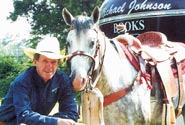 |
|||||
|
|
|||||
|
|||||
|
|
|||||
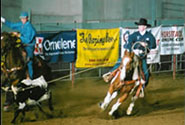 |
|||||
|
Michael heading for the great Sonny Gould |
|||||
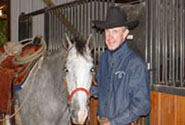 |
|||||
|
Michael & Blue |
 |
|
Please stop |
|
|
|
Send Michael |
Michael Johnson Books
michaelspeaks@msn.com
1172 CR 4122 Campbell, Texas 75422 (903) 862-2082

webmaster
pswope@candw-webmasters.com

